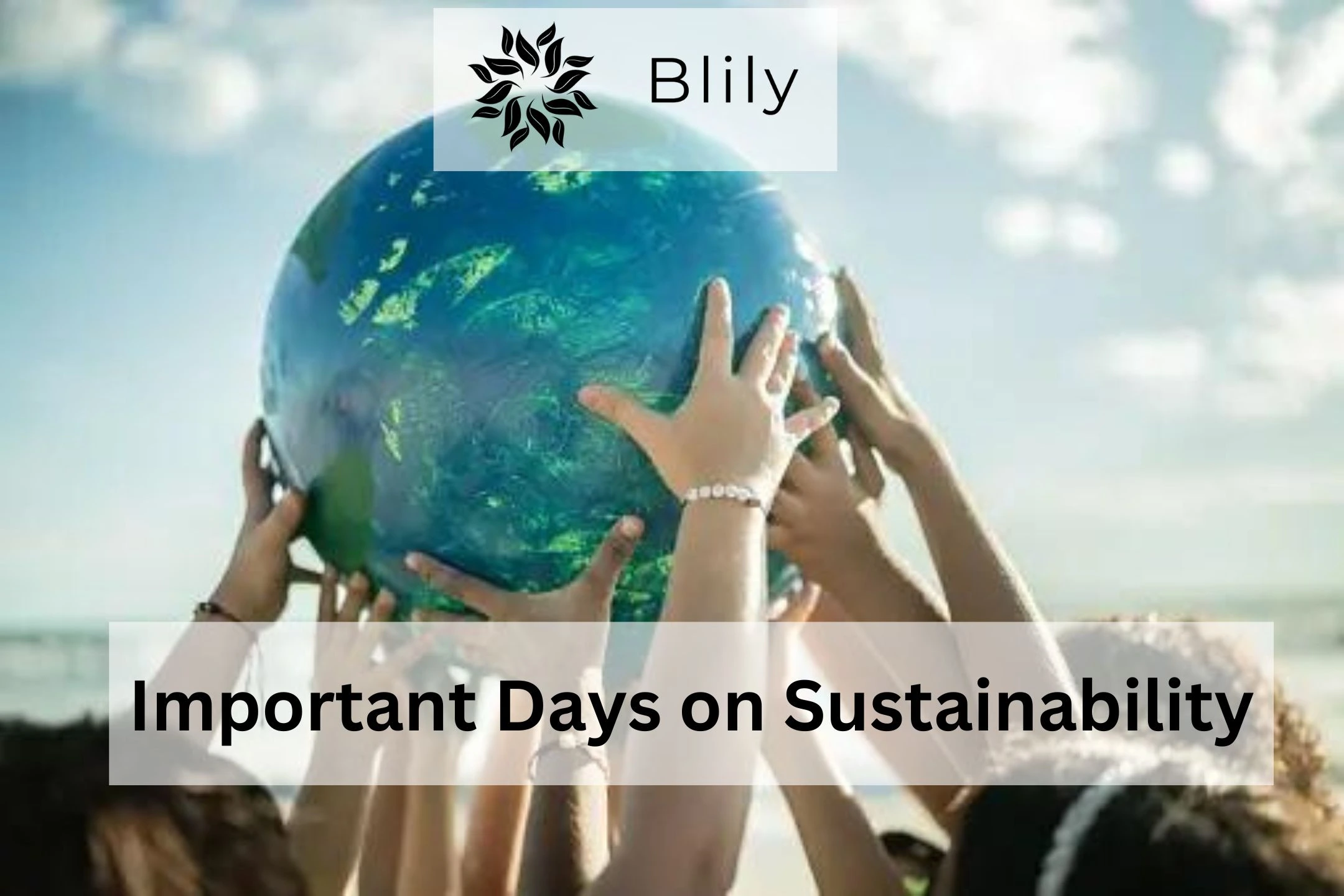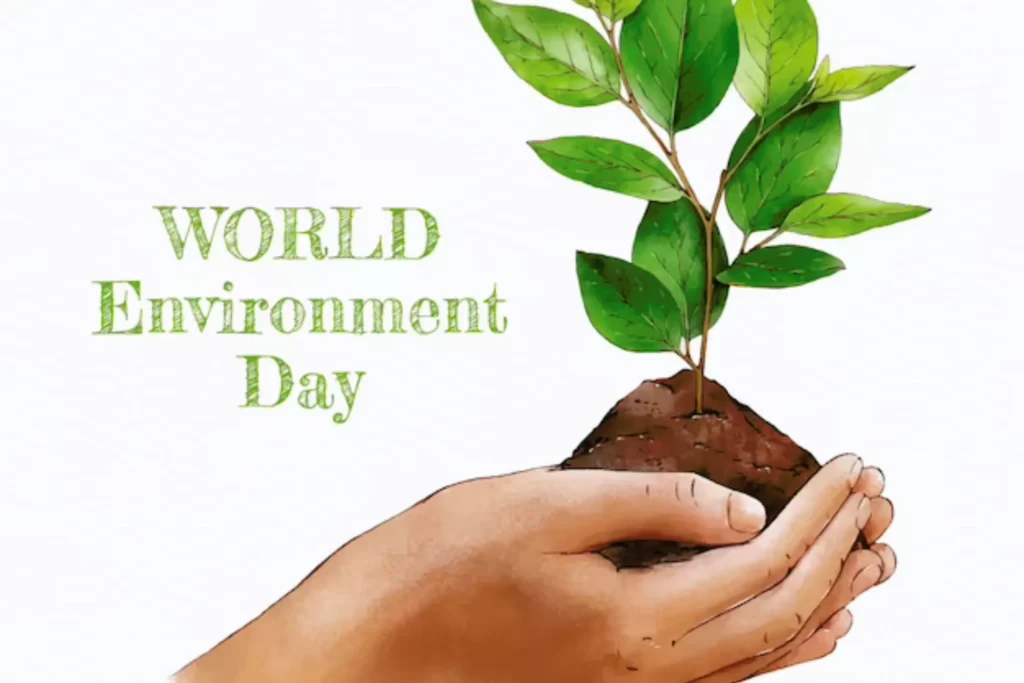Tanace Organics Pvt. Ltd

Important Days on Sustainability: Promoting a Greener Future
Important Days on Sustainability
Important Days on Sustainability, the concept of sustainability has gained immense significance. Sustainability refers to the responsible and conscious use of resources to meet present needs without compromising the ability of future generations to meet their own needs. It encompasses various aspects such as environmental protection, social equity, and economic development. To promote and create awareness about sustainability, designated days have been established to focus on specific sustainability-related issues. These days serve as powerful platforms to engage individuals, communities, and organizations in discussions, activities, and initiatives that contribute to a greener future.
Importance of Observing Sustainability Days: Observing sustainability days holds several key benefits. First, it raises awareness about pressing environmental and social challenges faced by our planet. By dedicating specific days to sustainability, we can shine a spotlight on critical issues, such as climate change, biodiversity loss, water scarcity, and pollution. This awareness is crucial for fostering a sense of urgency and inspiring action among individuals, businesses, and governments.
Table of Contents
World Environment Day

World Environment Day, observed on June 5th each year, holds immense significance as a global event dedicated to environmental awareness and action. This day provides a platform for individuals, communities, and organizations worldwide to come together and address pressing environmental challenges.
History and Objectives: World Environment Day was established by the United Nations General Assembly in 1972 to mark the beginning of the Stockholm Conference on the Human Environment. The conference aimed to raise global awareness about environmental issues and stimulate political attention and action. Since then, World Environment Day has been celebrated annually to promote environmental consciousness and encourage sustainable practices.
The objectives of World Environment Day are multifold. Firstly, it seeks to raise awareness about critical environmental concerns such as climate change, deforestation, pollution, and loss of biodiversity. By highlighting these issues, the day aims to mobilize individuals and communities to take proactive measures for environmental protection.
Earth Day

Earth Day, celebrated annually on April 22nd, holds great significance as a global event dedicated to environmental awareness and sustainability. This day serves as a reminder of the importance of protecting our planet and taking collective action to create a sustainable future.
Purpose and Background: Earth Day originated in the United States in 1970 when millions of people took to the streets to protest the deteriorating environmental conditions. The growing concern about pollution, habitat destruction, and the impacts of industrialization led to a call for action. As a result, Earth Day was established to raise awareness, mobilize communities, and advocate for environmental protection.
Connection between Earth Day and Sustainability: Earth Day and sustainability share a strong connection. Sustainability involves meeting the needs of the present generation without compromising the ability of future generations to meet their own needs. It encompasses environmental, social, and economic aspects, aiming for a balanced and harmonious relationship between humans and the natural world.
Earth Day promotes sustainability by highlighting the urgent need for environmental protection and encouraging individuals, communities, and organizations to adopt sustainable practices. It serves as a rallying point for people worldwide to come together and take action towards a more sustainable future.
Ways to Participate in Earth Day Activities:
Engage in environmental cleanup: Organize or join clean-up campaigns in your local community to remove litter and restore the cleanliness of natural areas, parks, and beaches.
Plant trees and create green spaces: Participate in tree planting initiatives to combat deforestation, enhance biodiversity, and improve air quality. You can also support or initiate projects that create green spaces in urban areas.
Support sustainable transportation: Use Earth Day as an opportunity to promote and practice sustainable transportation options such as walking, cycling, carpooling, or using public transportation. Encourage others to reduce their carbon footprint by adopting these alternatives.
World Water Day

World Water Day, observed on March 22nd each year, holds immense importance as a global event dedicated to highlighting the criticality of water and advocating for sustainable water management. This day serves as a reminder of the vital role water plays in our lives and the urgent need to address the global water crisis.
Importance of World Water Day: World Water Day aims to raise awareness about the importance of freshwater and the sustainable management of water resources. Access to clean and safe water is essential for human health, food security, economic development, and environmental sustainability. This day emphasizes the significance of water as a precious resource and the need for collective action to address water-related challenges.
The Global Water Crisis and Sustainable Water Management: The global water crisis is characterized by increasing water scarcity, inadequate access to clean water and sanitation, and environmental degradation of water sources. Population growth, climate change, pollution, and unsustainable water use practices exacerbate this crisis.
Sustainable water management is crucial to address the challenges posed by the global water crisis. It involves balancing the competing demands for water while ensuring its long-term availability for both human needs and ecosystems. Sustainable water management includes efficient water use, conservation, protection of water sources, and equitable access to water resources.
International Day of Forests
The International Day of Forests, celebrated on March 21st each year, holds immense significance as a global event dedicated to raising awareness about the importance of forests and promoting sustainable forest management. This day serves as a reminder of the vital role forests play in maintaining biodiversity, mitigating climate change, and supporting sustainable development.
Significance of the International Day of Forests: The International Day of Forests aims to emphasize the significance of forests as invaluable ecosystems that provide numerous ecological, social, and economic benefits. Forests cover approximately 31% of the Earth’s land area and support a wide array of life forms, making them crucial for the well-being of our planet and its inhabitants.
Role of Forests in Maintaining Biodiversity, Mitigating Climate Change, and Supporting Sustainable Development:
Biodiversity: Forests harbor a diverse range of plant and animal species, making them biodiversity hotspots. They provide habitats for countless organisms, many of which are endemic or endangered. Forests play a crucial role in preserving genetic diversity, supporting pollinators, and maintaining ecosystem balance.
Climate Change Mitigation: Forests act as carbon sinks, absorbing and storing carbon dioxide from the atmosphere. They play a vital role in mitigating climate change by sequestering carbon and reducing greenhouse gas emissions. Forests also help regulate local and regional climates, contributing to temperature moderation and rainfall patterns.
Sustainable Development: Forests provide numerous goods and services that contribute to sustainable development. They are a source of timber, non-timber forest products, and renewable energy. Forests also provide livelihood opportunities for local communities, support tourism, and offer recreational spaces. Sustainable forest management ensures the long-term provision of these benefits while preserving forest ecosystems.
World Oceans Day
World Oceans Day, observed on June 8th each year, holds tremendous importance as a global event dedicated to highlighting the significance of our oceans and promoting their conservation. This day serves as a reminder of the crucial role oceans play in regulating the climate, supporting marine ecosystems, and providing valuable resources.
Importance of World Oceans Day: World Oceans Day aims to raise awareness about the importance of oceans as essential life-supporting systems. Oceans cover over 70% of the Earth’s surface and are vital for the well-being of the planet and all living beings. This day encourages individuals and communities to take action to protect and preserve our oceans for future generations.
Crucial Role of Oceans in Regulating the Climate and Supporting Marine Ecosystems:
Climate Regulation: Oceans play a significant role in regulating the global climate. They act as a heat sink, absorbing and storing vast amounts of heat, which helps moderate temperature variations and stabilize climate patterns. Oceans also contribute to the global water cycle, influencing rainfall patterns and weather systems.
Biodiversity and Ecosystem Support: Oceans support an extraordinary diversity of marine life, ranging from microscopic plankton to majestic whales. They host intricate ecosystems, including coral reefs, mangroves, seagrass beds, and deep-sea habitats. These ecosystems provide habitats, breeding grounds, and food sources for countless marine species, contributing to biodiversity and maintaining ecological balance.
Oxygen Production: Phytoplankton, microscopic marine plants, produce more than half of the Earth’s oxygen through photosynthesis. Oceans act as the primary source of oxygen for the planet, making them essential for sustaining life on Earth.
Sustainable Gastronomy Day
Sustainable Gastronomy Day, celebrated on June 18th each year, focuses on the crucial link between sustainable food systems, agriculture, and overall sustainability. This day highlights the importance of promoting sustainable gastronomy as a means to nourish both people and the planet.
Concept of Sustainable Gastronomy Day: Sustainable Gastronomy Day recognizes the powerful role that food plays in achieving sustainable development goals. It emphasizes the need to make food production, consumption, and distribution practices more environmentally friendly, socially equitable, and economically viable.
Link between Sustainable Food Systems, Agriculture, and Overall Sustainability:
- Environmental Impact: Sustainable food systems prioritize ecological balance by minimizing the use of chemical inputs, reducing greenhouse gas emissions, protecting biodiversity, and promoting soil and water conservation. Sustainable agriculture practices, such as organic farming, agroforestry, and permaculture, contribute to mitigating climate change, preserving ecosystems, and reducing environmental degradation.
- Social and Economic Equity: Sustainable food systems promote social equity by ensuring fair wages and decent working conditions for farmers and food producers. They support local economies, enhance food security, and empower communities to have access to nutritious and culturally appropriate food. Sustainable agriculture practices also preserve traditional knowledge and farming techniques, fostering cultural diversity and heritage.
- Health and Nutrition: Sustainable gastronomy focuses on promoting nutritious and wholesome food choices. It encourages the consumption of fresh, seasonal, and locally sourced ingredients, reducing the dependence on processed and heavily packaged foods. Sustainable food systems prioritize the well-being of individuals, contributing to better health outcomes and reducing diet-related diseases.
Conclusion
Observing and recognizing important days on sustainability play a significant role in raising awareness, inspiring action, and fostering a greener and more sustainable future. These designated days provide a platform for individuals, communities, and organizations to come together and address pressing environmental challenges. By actively participating in events, initiatives, and campaigns associated with these days, we can make a tangible impact and contribute to positive change.
However, it is crucial to emphasize that sustainability is not limited to designated days alone. True sustainability requires continuous efforts and commitment beyond these specific occasions. Each day presents an opportunity to make sustainable choices and take actions that reduce our ecological footprint, conserve resources, and promote a more equitable and resilient world.
Therefore, let us not confine our efforts to specific days but integrate sustainable practices into our daily lives. By adopting sustainable habits, promoting environmental education, supporting sustainable businesses, and advocating for policy changes, we can collectively create a lasting impact on our planet.
Together, let us actively participate, engage, and lead by example in fostering a greener and more sustainable future. Every action counts, and our collective efforts can pave the way for a world where the well-being of both people and the planet are prioritized.
Frequently Asked Questions and Answers
Q: What is sustainability?
A: Sustainability refers to the responsible and conscious use of resources to meet present needs without compromising the ability of future generations to meet their own needs. It encompasses environmental protection, social equity, and economic development, striving for a balance between these three pillars.
Q: Why is sustainability important?
A: Sustainability is important because it addresses the urgent environmental challenges we face, such as climate change, deforestation, biodiversity loss, and resource depletion. By practicing sustainability, we can mitigate these issues, preserve natural resources, protect ecosystems, promote social well-being, and ensure a sustainable future for generations to come.
Q: How can individuals contribute to sustainability?
A: Individuals can contribute to sustainability in various ways. Some examples include reducing energy and water consumption, adopting sustainable transportation options, recycling and minimizing waste, supporting local and sustainable businesses, choosing sustainable and ethically sourced products, and being mindful of their consumption patterns.
Q: What are some sustainable practices for businesses?
A: Businesses can adopt sustainable practices by implementing energy-efficient technologies, reducing waste and implementing recycling programs, using renewable energy sources, implementing sustainable supply chain management, supporting fair trade and ethical sourcing, engaging in corporate social responsibility initiatives, and promoting a culture of sustainability among employees.
Q: How does sustainability relate to economic development?
A: Sustainability and economic development are interconnected. Sustainable practices can contribute to long-term economic growth by reducing costs, improving resource efficiency, fostering innovation, and creating new job opportunities in green industries. Sustainable development ensures that economic progress is achieved without depleting natural resources or compromising the well-being of future generations.
Q: What is the role of education in sustainability?
A: Education plays a crucial role in promoting sustainability. By providing knowledge and raising awareness about environmental issues, sustainable practices, and the interconnectedness of social, economic, and environmental factors, education empowers individuals to make informed decisions and take sustainable actions in their personal lives, careers, and communities.
Q: How can governments promote sustainability?
A: Governments can promote sustainability by implementing and enforcing policies and regulations that support renewable energy, environmental protection, sustainable agriculture, waste management, and sustainable urban planning. They can also provide incentives and subsidies for sustainable practices, invest in green technologies and infrastructure, and promote education and public awareness campaigns on sustainability.
Q: How does sustainability benefit future generations?
A: Sustainability ensures that future generations have access to the resources and quality of life necessary for their well-being. By practicing sustainability, we preserve natural resources, protect ecosystems, mitigate climate change, and promote social equity, thereby creating a more sustainable and resilient world for future generations to thrive in.
Q: How can communities come together for sustainability initiatives?
A: Communities can come together for sustainability initiatives by organizing local events, participating in clean-up drives, establishing community gardens or farmer’s markets, creating recycling programs, promoting sustainable transportation options, supporting local environmental organizations, and engaging in collaborative efforts to address local sustainability challenges. Collaboration and collective action within communities can drive meaningful change and foster a culture of sustainability.







